中西方日常交际中的文化差异
- 格式:docx
- 大小:19.92 KB
- 文档页数:9
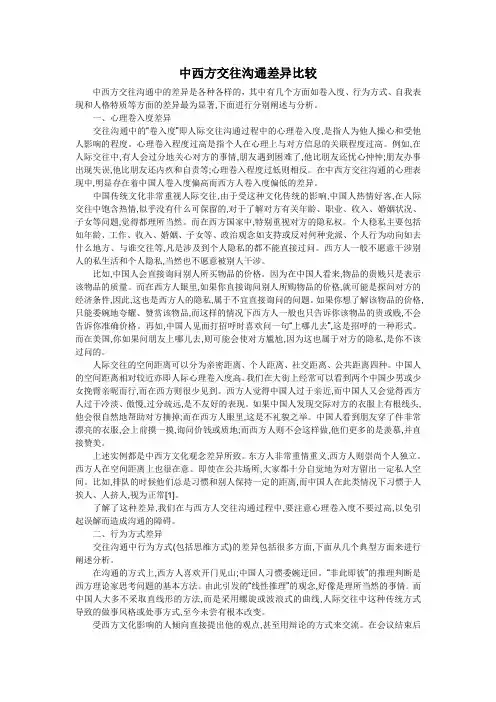
中西方交往沟通差异比较中西方交往沟通中的差异是各种各样的,其中有几个方面如卷入度、行为方式、自我表现和人格特质等方面的差异最为显著,下面进行分别阐述与分析。
一、心理卷入度差异交往沟通中的“卷入度”即人际交往沟通过程中的心理卷入度,是指人为他人操心和受他人影响的程度。
心理卷入程度过高是指个人在心理上与对方信息的关联程度过高。
例如,在人际交往中,有人会过分地关心对方的事情,朋友遇到困难了,他比朋友还忧心忡忡;朋友办事出现失误,他比朋友还内疚和自责等;心理卷入程度过低则相反。
在中西方交往沟通的心理表现中,明显存在着中国人卷入度偏高而西方人卷入度偏低的差异。
中国传统文化非常重视人际交往,由于受这种文化传统的影响,中国人热情好客,在人际交往中饱含热情,似乎没有什么可保留的,对于了解对方有关年龄、职业、收入、婚姻状况、子女等问题,觉得都理所当然。
而在西方国家中,特别重视对方的隐私权。
个人稳私主要包括如年龄、工作、收入、婚姻、子女等、政治观念如支持或反对何种党派、个人行为动向如去什么地方、与谁交往等,凡是涉及到个人隐私的都不能直接过问。
西方人一般不愿意干涉别人的私生活和个人隐私,当然也不愿意被别人干涉。
比如,中国人会直接询问别人所买物品的价格。
因为在中国人看来,物品的贵贱只是表示该物品的质量。
而在西方人眼里,如果你直接询问别人所购物品的价格,就可能是探问对方的经济条件,因此,这也是西方人的隐私,属于不宜直接询问的问题。
如果你想了解该物品的价格,只能委婉地夸耀、赞赏该物品,而这样的情况下西方人一般也只告诉你该物品的贵或贱,不会告诉你准确价格。
再如,中国人见面打招呼时喜欢问一句“上哪儿去”,这是招呼的一种形式。
而在美国,你如果问朋友上哪儿去,则可能会使对方尴尬,因为这也属于对方的隐私,是你不该过问的。
人际交往的空间距离可以分为亲密距离、个人距离、社交距离、公共距离四种。
中国人的空间距离相对较近亦即人际心理卷入度高。
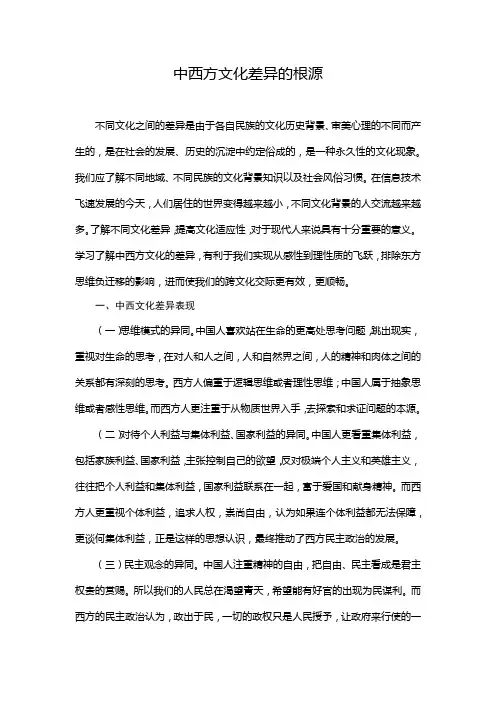
中西方文化差异的根源不同文化之间的差异是由于各自民族的文化历史背景、审美心理的不同而产生的,是在社会的发展、历史的沉淀中约定俗成的,是一种永久性的文化现象。
我们应了解不同地域、不同民族的文化背景知识以及社会风俗习惯。
在信息技术飞速发展的今天,人们居住的世界变得越来越小,不同文化背景的人交流越来越多。
了解不同文化差异,提高文化适应性,对于现代人来说具有十分重要的意义。
学习了解中西方文化的差异,有利于我们实现从感性到理性质的飞跃,排除东方思维负迁移的影响,进而使我们的跨文化交际更有效,更顺畅。
一、中西文化差异表现(一)思维模式的异同。
中国人喜欢站在生命的更高处思考问题,跳出现实,重视对生命的思考,在对人和人之间,人和自然界之间,人的精神和肉体之间的关系都有深刻的思考。
西方人偏重于逻辑思维或者理性思维;中国人属于抽象思维或者感性思维。
而西方人更注重于从物质世界入手,去探索和求证问题的本源。
(二)对待个人利益与集体利益、国家利益的异同。
中国人更看重集体利益,包括家族利益、国家利益,主张控制自己的欲望,反对极端个人主义和英雄主义,往往把个人利益和集体利益,国家利益联系在一起,富于爱国和献身精神。
而西方人更重视个体利益,追求人权,崇尚自由,认为如果连个体利益都无法保障,更谈何集体利益,正是这样的思想认识,最终推动了西方民主政治的发展。
(三)民主观念的异同。
中国人注重精神的自由,把自由、民主看成是君主权贵的赏赐。
所以我们的人民总在渴望青天,希望能有好官的出现为民谋利。
而西方的民主政治认为,政出于民,一切的政权只是人民授予,让政府来行使的一种公权力。
(四)科学观的异同。
中国人更相信先人的经验和权威,相信古人甚至超过相信今人,迷信权威,缺乏创新和探索精神。
而西方人重视实践和理论,富于探险精神,倡导理性思维。
通过正规的学院式教育对科学成果进行普及和推广,极大的促进了科学的发展,也最终建立了完整的科学体系。
(五)中西方的道德观是迥然不同的。
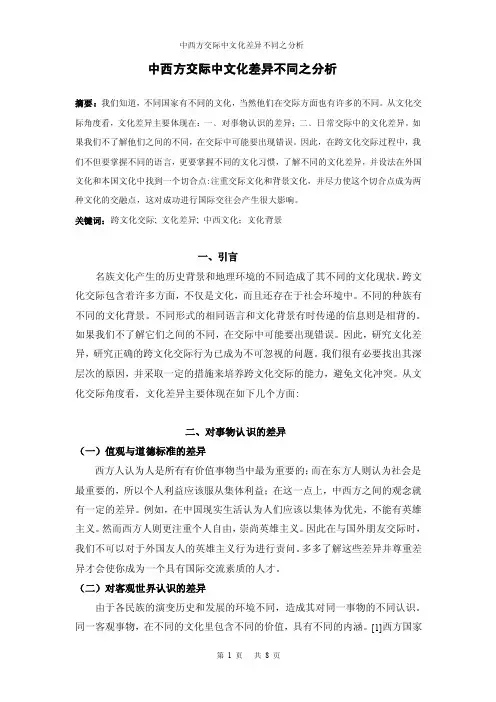
中西方交际中文化差异不同之分析摘要:我们知道,不同国家有不同的文化,当然他们在交际方面也有许多的不同。
从文化交际角度看,文化差异主要体现在:一﹑对事物认识的差异;二﹑日常交际中的文化差异。
如果我们不了解他们之间的不同,在交际中可能要出现错误。
因此,在跨文化交际过程中,我们不但要掌握不同的语言,更要掌握不同的文化习惯,了解不同的文化差异,并设法在外国文化和本国文化中找到一个切合点:注重交际文化和背景文化,并尽力使这个切合点成为两种文化的交融点,这对成功进行国际交往会产生很大影响。
关键词:跨文化交际; 文化差异; 中西文化;文化背景一、引言名族文化产生的历史背景和地理环境的不同造成了其不同的文化现状。
跨文化交际包含着许多方面,不仅是文化,而且还存在于社会环境中。
不同的种族有不同的文化背景。
不同形式的相同语言和文化背景有时传递的信息则是相背的。
如果我们不了解它们之间的不同,在交际中可能要出现错误。
因此,研究文化差异,研究正确的跨文化交际行为已成为不可忽视的问题。
我们很有必要找出其深层次的原因,并采取一定的措施来培养跨文化交际的能力,避免文化冲突。
从文化交际角度看,文化差异主要体现在如下几个方面:二、对事物认识的差异(一)值观与道德标准的差异西方人认为人是所有有价值事物当中最为重要的;而在东方人则认为社会是最重要的,所以个人利益应该服从集体利益;在这一点上,中西方之间的观念就有一定的差异。
例如,在中国现实生活认为人们应该以集体为优先,不能有英雄主义。
然而西方人则更注重个人自由,崇尚英雄主义。
因此在与国外朋友交际时,我们不可以对于外国友人的英雄主义行为进行责问。
多多了解这些差异并尊重差异才会使你成为一个具有国际交流素质的人才。
(二)对客观世界认识的差异由于各民族的演变历史和发展的环境不同,造成其对同一事物的不同认识。
同一客观事物,在不同的文化里包含不同的价值,具有不同的内涵。
[1]西方国家有爱狗的传统,而中国人却崇敬龙。

浅谈中西方文化差异及跨文化交流摘要中西方因所处地理位置不同、文化背景不同,衍生出了其不同的历史文化。
文化是一种社会现象,是人们长期创造形成的产物。
同时又是一种历史现象,是社会历史的积淀物。
文化是指人类社会历史实践过程中所创造的物质财富,精神财富和相应的创造才能的总和.中西文化作为世界文化的重要组成部分,各自包含着丰富的内容,具有鲜明的特色。
伴随着全球经济化和政治多极化的步伐,认识中西方文化的差异,有利于区别中西方文化了解其背后的文化根源,有利于中西方之间的跨文化交流。
关键字:中西文化文化差异价值观念跨文化交流文化是指人类社会历史实践过程中所创造的物质财富,精神财富和相应的创造才能的总和.同时,文化也是一种社会现象,是人们长期创造形成的产物。
同时又是一种历史现象,是社会历史的积淀物。
虽然不同的民族有着自己区别于其他民族的特殊的文化心理素,思维方式,价值尺度,道德规范和情感趣向等,但文化间的差异并不能阻碍文化间的交流,从文化背景、价值观念、思维方式、风俗习惯、宗教信仰等方面去认识中西方文化的差异,隔阂一中西方文化差异及比较1、中西文化背景的差异中国文化受到儒家思想和佛教、道教文化的影响深远,其根源可以上溯到两千多年前的春秋战国时代,这种文化总的表现为:注重个人修养,注重道德力量,反对武力,注重与他人、自然的和谐相处,追求精神的超脱,以“仁”和“孝”为社会核心。
同时更注重于自给自足的内向型文化。
西方文明主要来自于希腊文明、罗马文明和基督教文明三大源流。
受基督教影响深远,看重个人的自由和权利,注重实践和探索,更注重于对自然的探索和求证,从物质层面去考量生命的本源。
以“爱”为社会核心。
同时具有开放性的外向型文化。
2中西方价值观和思维方式的差异价值观,西方世界相信人本位,人是受尊敬的名词。
一个人攻击另一个人,不管是辱骂殴打或是诬陷暗算,即使受攻击的一方再无能再愚蠢再有错误,也都为舆论所不容,为法律所追究,哪怕你有钱有权势。
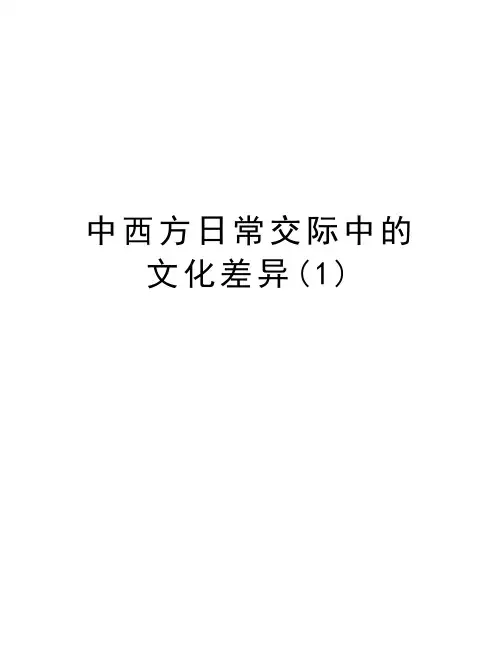
中西方日常交际中的文化差异(1)中西方日常交际中的文化差异(商务英语专业082班,孙静)摘要:汉语与英语中有大量的日常对话,由于地域文化、历史文化、风俗习惯、宗教信仰及历史典故的不同,日常交际中也呈现出诸多文化差异。
随着经济全球化、信息全球化时代的到来,中国与西方国家之间的交流和合作越来越密切。
但是,由于缺乏对西方国家文化背景的了解,在中国人与西方人交际的过程中,出现了一些交际障碍和误解,本文主要就日常交际中容易引起误会的中文化差异进行分析和比较。
There are quite a lot of daily dialogues both in Chinese and English, however, because of the differences of background, history, custom, religion and history story’s culture, there exists lots of culture differences in daily conversation. With the coming of globalization of economy and information, the cooperation between China and Western countries is becoming closer. Yet, due to the lack of culture background of western countries, there exists some barriers and misunderstandings during the communication between Chinese and western people. And this article aims to analyze and compare the culture differences between China and western countries which are more likely causing misunderstandings.关键词:中西方文化;日常交际;差异中西方使用两种不同的语言汉语和英语,它们各有反映着本身独特的文化背景和凝重的历史传统,因而在日常交际中也存在着许多差异。
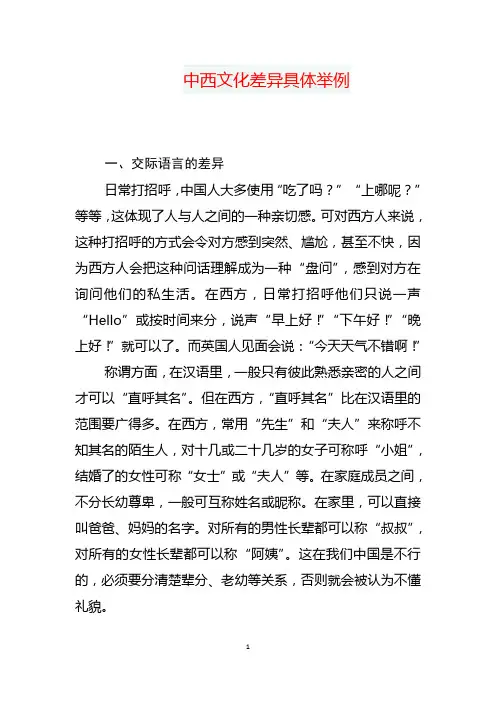
中西文化差异具体举例一、交际语言的差异日常打招呼,中国人大多使用“吃了吗?”“上哪呢?”等等,这体现了人与人之间的一种亲切感。
可对西方人来说,这种打招呼的方式会令对方感到突然、尴尬,甚至不快,因为西方人会把这种问话理解成为一种“盘问”,感到对方在询问他们的私生活。
在西方,日常打招呼他们只说一声“Hello”或按时间来分,说声“早上好!”“下午好!”“晚上好!”就可以了。
而英国人见面会说:“今天天气不错啊!”称谓方面,在汉语里,一般只有彼此熟悉亲密的人之间才可以“直呼其名”。
但在西方,“直呼其名”比在汉语里的范围要广得多。
在西方,常用“先生”和“夫人”来称呼不知其名的陌生人,对十几或二十几岁的女子可称呼“小姐”,结婚了的女性可称“女士”或“夫人”等。
在家庭成员之间,不分长幼尊卑,一般可互称姓名或昵称。
在家里,可以直接叫爸爸、妈妈的名字。
对所有的男性长辈都可以称“叔叔”,对所有的女性长辈都可以称“阿姨”。
这在我们中国是不行的,必须要分清楚辈分、老幼等关系,否则就会被认为不懂礼貌。
中西语言中有多种不同的告别语。
如在和病人告别时,中国人常说“多喝点开水”、“多穿点衣服”、“早点休息”之类的话,表示对病人的关怀。
但西方人绝不会说“多喝水”之类的话,因为这样说会被认为有指手画脚之嫌。
比如他们会说“多保重”或“希望你早日康复”等等。
二、餐饮礼仪的差异中国人有句话叫“民以食为天”,由此可见饮食在中国人心目中的地位,因此中国人将吃饭看作头等大事。
中国菜注重菜肴色、香、味、形、意俱全,甚至于超过了对营养的注重,只要好吃又要好看,营养反而显得不重要了。
西方的饮食比较讲究营养的搭配和吸收,是一种科学的饮食观念。
西方人多注重食物的营养而忽略了食物的色、香、味、形、意如何,他们的饮食多是为了生存和健康,似乎不讲究味的享受。
在餐饮氛围方面,中国人在吃饭的时候都喜欢热闹,很多人围在一起吃吃喝喝,说说笑笑,大家在一起营造一种热闹温暖的用餐氛围。
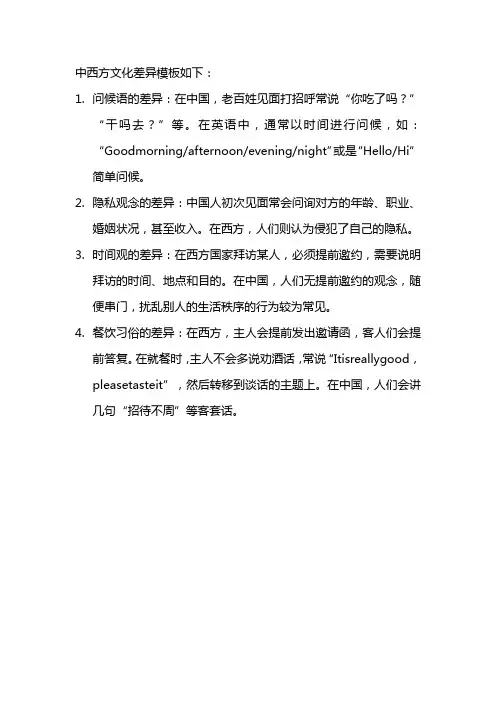
中西方文化差异模板如下:
1.问候语的差异:在中国,老百姓见面打招呼常说“你吃了吗?”
“干吗去?”等。
在英语中,通常以时间进行问候,如:“Goodmorning/afternoon/evening/night”或是“Hello/Hi”
简单问候。
2.隐私观念的差异:中国人初次见面常会问询对方的年龄、职业、
婚姻状况,甚至收入。
在西方,人们则认为侵犯了自己的隐私。
3.时间观的差异:在西方国家拜访某人,必须提前邀约,需要说明
拜访的时间、地点和目的。
在中国,人们无提前邀约的观念,随便串门,扰乱别人的生活秩序的行为较为常见。
4.餐饮习俗的差异:在西方,主人会提前发出邀请函,客人们会提
前答复。
在就餐时,主人不会多说劝酒话,常说“Itisreallygood,pleasetasteit”,然后转移到谈话的主题上。
在中国,人们会讲几句“招待不周”等客套话。
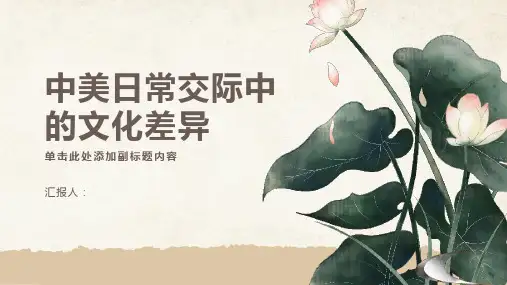
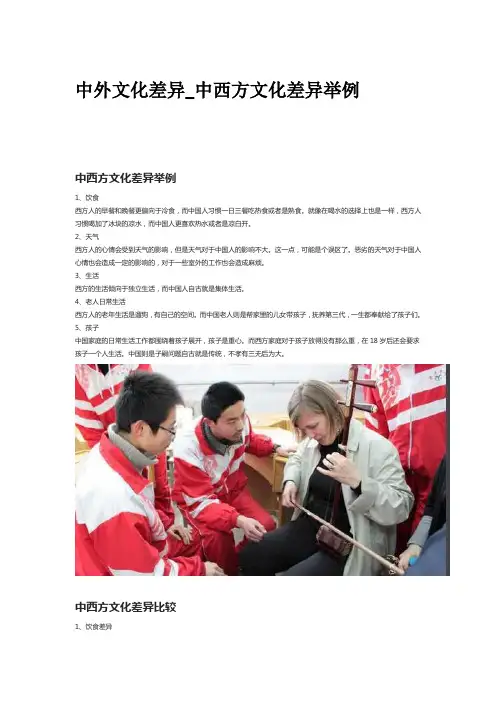
中外文化差异_中西方文化差异举例中西方文化差异举例1、饮食西方人的早餐和晚餐更偏向于冷食,而中国人习惯一日三餐吃热食或者是熟食。
就像在喝水的选择上也是一样,西方人习惯喝加了冰块的凉水,而中国人更喜欢热水或者是凉白开。
2、天气西方人的心情会受到天气的影响,但是天气对于中国人的影响不大。
这一点,可能是个误区了。
恶劣的天气对于中国人心情也会造成一定的影响的,对于一些室外的工作也会造成麻烦。
3、生活西方的生活倾向于独立生活,而中国人自古就是集体生活。
4、老人日常生活西方人的老年生活是遛狗,有自己的空间。
而中国老人则是帮家里的儿女带孩子,抚养第三代,一生都奉献给了孩子们。
5、孩子中国家庭的日常生活工作都围绕着孩子展开,孩子是重心。
而西方家庭对于孩子放得没有那么重,在18岁后还会要求孩子一个人生活。
中国则是子嗣问题自古就是传统,不孝有三无后为大。
中西方文化差异比较1、饮食差异西方是一种理性饮食观念。
不论食物的色、香、味、形如何,而营养一定要得到保证,讲究一天要摄取多少热量、维生素、蛋白质等等。
即便口味千篇一律,也一定要吃下去——因为有营养。
2、观念差异西方人认为一个人只有完全脱离社会关系,真正做到“关注自我”,才能成为一个“真正意义上的人”。
而在中国的文化中,人之所以为人,必须成为社会关系中的一环。
儒家文化中定义:“仁者,人也。
”强调整体和综合。
3、服饰差异西方男士在正式社交场合通常穿保守式样的西装,内穿白衬衫,打领带。
他们喜欢黑色,因此一般穿黑色的皮鞋。
西方女士在正式场合要穿礼服套装。
另外女士外出有戴耳环的习俗。
西方国家,尤其是在美国,平时人们喜欢穿着休闲装,如T恤加牛仔服。
当今中国人穿着打扮日趋西化,传统的中山装、旗袍等已退出历史舞台。
正式场合男女着装已与西方并无二异。
在平时的市井生活中,倒会看到不少人穿着背心、短裤、拖鞋等不合礼仪的服饰。
4、语言差异象形文字强调视觉和闪点,拼音语言强调逻辑和哲学,所以中国文化注重的是写意和系统思维,而西方文化则更多注重抽象和数据。
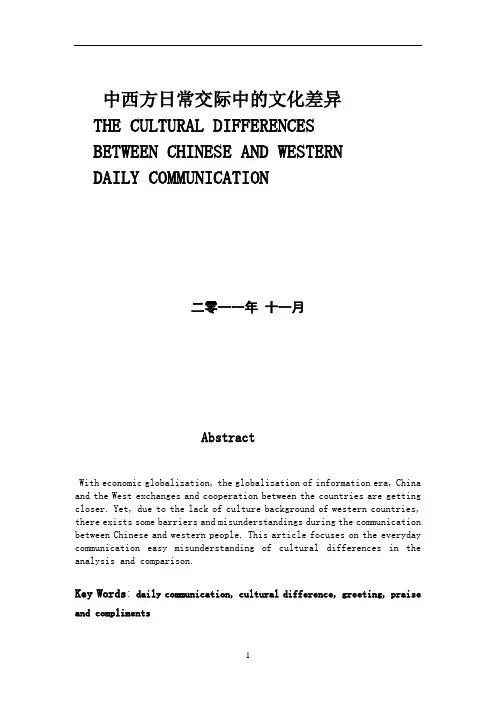
中西方日常交际中的文化差异THE CULTURAL DIFFERENCESBETWEEN CHINESE AND WESTERNDAILY COMMUNICATION二零一一年十一月AbstractWith economic globalization, the globalization of information era, China and the West exchanges and cooperation between the countries are getting closer. Yet, due to the lack of culture background of western countries, there exists some barriers and misunderstandings during the communication between Chinese and western people. This article focuses on the everyday communication easy misunderstanding of cultural differences in the analysis and comparison.Key Words: daily communication, cultural difference, greeting, praise and complimentsContentsPartⅠ Differences in terms of call (3)PartⅡ Hello differences in terms (4)Part ⅢDifferences in terms of farewell (5)Part Ⅳ Differences in praise and compliments and the response (6)Part ⅤDifferences in table manners (8)Seating arrangement (9)Serving order (10)Tableware (11)Stop cooking method (12)Part VI Topic selection and differences in privacy (14)References (15)PartⅠ Differences in terms of callHello is the daily life of most ordinary things, but that it is quite common for things can reflect in the Western cultural differences. In China, people touching face each other and asked:" have you had dinner yet"" where to go"" no work today" This is the Chinese most familiar is the most common way of greeting, but if you take these words and Westerners greet,foreigners must be surprised, or even misleading. For example, Chinese friend asked a foreign friend: Have you had your meal It was just asking pleasantries, Westerners think you ask to invite him for dinner! While he waits for you invited him, but you talk about something else, which often make each other be rather baffling.They think: don't ask me out to dinner, why ask I had your meal For example: you ask foreign friends: where are you going This is a caring greeting, but Westerners misunderstanding and resentment, think you to interfere in others' affairs.In western countries people not familiar with the meeting say hello, just say: Hi, Hello or Good morning can be; first met with How do you do hello And do not say how you are If met familiar friend, can talk about the weather, traffic etc., but do not talk about personal things.PartⅡ Hello differences in termsWhether in China or abroad, to see friends or acquaintances say hello, is a common courtesy behavior.Chinese people like to use when they meet, "you eat it" Come and greet each other, butthe greeting phrase actually has lost its literal meaning, not to ask for information, but rather a way of greeting.Therefore, the answer is "eating" or "not eat" are irrelevant.However, if directly translated into English literally "Have you had your dinner" To greet the West, according to their cultural practices, means to invite each other to dinner;if you ask men and women are said to be dating each other or the desire to make friends.Another commonly used in Chinese language greeting is "Where are you going” This sentence is hello in Chinese, rather than asking people really want to know where to go.So, any other party can give an answer, also not feel embarrassed.However, the same way Westerners greet "Where are you going", "Where have you been" Westerners often understood as a message asking the questions, make them feel embarrassed, even angry they will feel the speaker interfere with their private affairs.Although they do not say lips, and my heart may think: "Why do you ask these questions It's none of your business."Perhaps more attention to high British and American people for reasons of efficiency, not between people as the Chinese enthusiasm, the same in the above case, the common greeting phrase is generally relatively simple, such as "Hi", "Hello", "How are you" or "Good morning!", "Good afternoon!", "Good evening!"And so on.Part ⅢDifferences in terms of farewellAccording to Chinese custom, the guests leave, the owner of the guests to the door, the guests of the owner said, "Please stay", the last director to say "go", "walking" kind of courtesy.If the American people we have in accordance with the Chinese people used to say "go slowly", "walk slowly" they will feel angry, "why should I go slowly I am strong enough!"Britain's etiquette is to tell the guests to the door "Bye, drop in again." Kind of thing, the guests will answer "yes, I will." Or "ok, bye." Or "see you" and so on.Also say goodbye to the Chinese people is generally very simply, is often the first look at the watch, and then stand up and say something "I am leaving now." Anglo-American countries in this way will make people feel very abrupt, surprised.Generally in accordance with their habits, usually said to be ten minutes ahead of his intention to leave.A Chinese student to the teacher there to ask questions of the United States, American teachers received him warmly, but also patiently answered all the questions of students.Leave, the student said: I am sorry to have wasted a lot of you time, Iam leaving. “The syntax of these two words completely correct, the U.S. has caused the teacher's hard to understand, he does not understand why he answered the question and the student identified as a waste of time, do the students think that he actually spent time no harvest According to Western custom, on such occasions to leave, first to thank each other's help, and then said goodbye, and often to find an excuse, it can be said: "Thanks a lot for your help. I am afraid I must be leaving now.Part ⅣDifferences in praise and compliments and the response" The American people 's mode of thinking is linear, like direct expression;Therefore, when communication with the Chinese people, foreigners are often surprised to find that, when they praise or compliments, when the Chinese people, Chinese people always know what to do, too humble or demean themselves, even repeatedly denied, and not as frankly as foreign language gratitude.When someone praised you say: "That's a beautiful dress you have on!" Modesty of the Chinese people is likely to say: "No, no, it's just a very ordinary dress." Or “No. In fact I've worn it for several years. “A Chinese man took his wife to an American friend's house dining; meeting, American friendswho praised his wife said "Your wife is very beautiful!"The Chinese people was very pleased, but his mouth said "Where, where." The Americans surprised a moment, hesitated a moment and said "Eyes, nose, mouth ⋯⋯."According to British and American people's habits, when they praise others, people always want to thank or straightforward manner acceptable answer, do not want the other to humble, polite way to answer. Similarly, when Westerners praise and congratulations by others, they often openly accepted the praise and compliments will come right to say: "Thank you!" That they think the other side of the praise is sincere; the commendable thing is to be commended.Part Ⅴ Differences in table mannersSeating arrangementIn table manners in China: first call the guests seated on the seats, and then please order the elderly seated next to seated guests. When entering from the left side of the chair seat, seat post does not move Chopsticks, not to sound to come up, get up and do not move around.If there's anything to the master greet. Guests should be invited to sit down to wait for the owner, theowner must be careful not to call the guests sit in a seat near the serving, this is a taboo.If sitting round the table, facing the door is the main seat. Higher grade hotels, will be distinguished with a napkin, napkins, not just the tallest position to sit, unless you intend to better treat.The more popular Chinese food feast of modern etiquette is to continue the traditional ritual with reference to foreign countries on the basis of evolved. The banquet seating to the right by the West as the law, the first guest of honor sat in the owner the right, the second guest of honor guest of honor at the first host on the left or right side of the door to face the master, of course, is greeted errands Pieria sitting Table manners in the West: the hostess announced that dinner is ready, the man of the house in turn will lead the guests seated, while the hostess is walking at the end. Some owners will be careful to place the name cards on the table to show seating, if not this arrangement, then the principle is generally seating arrangements: separate seating arrangements for men and women sitting on the principle, priority seating male subject and object, its location in the hostess the right, while the female subject and object in the male subject and object on the right, the other couple seated diagonally places.Men and women showeda couple sit in the open and lively American banquet hope that with a feast on the seating arrangements to enhance each other's familiar, but also can dine topic diversification, atmosphere and music.Serving orderWay serving the whole of the following: First, the side dish market self-created by the people; second is holding a dinner plate by the waiter points to each to each; third is in full bloom with small dishes, each A. In a formal banquet, eat dishes like the slide show, each dish.So how do you call it a meal of Chinese food Be called a cold to stimulate the appetite, then called a pot of soup, hot soup will help increase the body temperature began to drink hot soup after tasting main course, usually called the main course according to their own tastes, but it is necessary is called a plate full of spicy dishes, was considered appropriate for the meal of Chinese food, to spicy rice dishes with light, so spicy and mild dishes, rice light and fragrant;The finale of a meal is a dessert food, usually soup, such as red bean paste, sesame paste, etc., there are other types, such as pudding, pancakes, ice cream, the same sweet and delicious.These programs not only make the wholefeast harmonious and orderly process, but also to subject-object identity and emotion to reflect and exchange. Therefore, the table manners can feast on the activities of a successful comprehensive, so that the cultivation of both subject and object has been fully demonstrated.TablewareChopsticks are the main lunch dishes. Use chopsticks, you usually have dual use. Use chopsticks to take food, meals, pay attention to the following minor problems: First, regardless of whether the remnants of food chopsticks, do not lick.Licked to take their food with chopsticks, poured appetite; second, and talking to people, to temporarily put down the chopsticks, not side to speak, while wildly dancing like a baton chopsticks; Third, do not put chopsticks on the food above the vertical interpolation. Because of this interpolation method, only the offerings to the dead when it is used; four functions are strictly chopsticks. Folder is used chopsticks to take food. To teeth, scratching or folders to take food to things that are beyond rude.The main role is to scoop a spoon to take food, food. Sometimes, when feeding with chopsticks, spoon can also be used to assist. Try not to pick a single dish with a spoon.Scoop the food in, you can place in the original "pause" moment, when the soup will not go down dirty, back again to enjoy. Not being spoon should be placed on his plate, do not put it directly on the table, or make it in the food "stand at attention."With a spoon to take food, to eat immediately, or on their dish, do not then it fell back into place. If access to food too hot, not with a spoon to scoop to scoop, and do not mouth the blow, you can first put it in your bowl so cool, and then eat. Do not spoon stuffed into his mouth, or repeatedly sucking, licking. Point of the plate is smaller plates, mainly to hold the food, and bowls come first in use. Plate on the table generally stay in place, and do not stack together. The main role of the food dish is used to temporarily put the food tray from the public access to enjoy the dishes.Do not eat the residue, bone, thorn do not spit on the ground, on the table, but should be taken lightly on the front of food dish, put the time can not be directly from the mouth spit in the food dish on the plate to use chopsticks into the next. If the food dish filled, so that attendants can change.Glass is mainly used in full bloom water, soft drinks, fruit juice, cola and other soft drinks use. Do not use it to hold wine, and do not upside down cup. In addition, the drink into his mouth and then spit back what is not glass.In the United States on the table: There are Western cutlery knives, forks, spoons, plates, glasses and so on. Methods in place, Chinese food is simple, and Western is more complicated. The Western world senior banquet table is the basic uniform swing.Soup should be to the inside scoop from the outer edge of the dishes, not to stay after drinking spoon in a bowl, should be placed on a plate. If the soup is used for deep dish, spoon should be placed on deep-dish, spoon handle toward the right. In tea or coffee, exhausted after the transfer should be placed on a plate spoon, directly pick up the coffee cup on the mouth, rather than transfer to scoop with a spoon.Stop cooking methodIn China the table, finished eating, chopsticks should be neatly put in a bowl on the right by the table, and so everyone should have put down the chopsticks, the only left their seats when the host signal, can not finish their meals, they dropped the chopsticks left the meeting.In the West on the table, the end of the arrangements and a meal in two ways: the end of the meal, you can fork up the following, a knife and fork in the blade side close together, placed in parallel on the plate, put the handle as far as possible into the plate, the touch and soavoid the drop, the waiter also easier to clean up.When attending wedding banquets, regardless of how the dishes put into the "dining in" position, as long as the end of the main guests dine, they should immediately put all the dishes put away. So dinner, remember that begin with the center of the main guests.At the banquet, each with a knife and fork to eat a dish, placed in front of the knife and fork, is accessible from the outside inward in turn, placed the order because the fork is the order of each dish served. Run out of knives and forks, serving also ended.Half-way conversation or rest is required, it should be eight-shaped flat knife and fork was mounted on both sides of the plate. On the contrary, the handle toward your knife and fork side by side on a plate, then the dish has been properly used; the waiter will put the plate removed.Appetizer or dessert, if it is directly eaten with a fork folded his food, definitely not necessary to deliberately use a knife. Never used the knife on the table so you can, the waiter will automatically be taken away.Part VI Topic selection and differences in privacyMany topics are Westerners and Chinese people can accept. Suchas personal hobbies, holidays, weather, local or national events, professional movies or books. But many Western think the following topics related to personal privacy, therefore, when dealing with them, talk about these topics must be cautious.1.Age. In Western society, people are reluctant to talk about their age, not willing to tell others about this inquiry, particularly women, whether young or old. Of course there are exceptions, some elderly people will be glad to tell other people their age, especially when they think they were also relatively very young. But not how to directly ask people age, are unwise, unless someone voluntarily talking about.2.Income. Chinese people ask each other how much money is a common occurrence. But the West that a person's income is entirely a private matter, even among family members, may not know each other monthly salary, so you should avoid asking such questions.3.The price. In the West people can talk about price, but usually will not ask each other how much was spent to sell things, to ask such questions have to use indirect expression, I really like it! Was it expensive Because such an indirect question is asked so that the other some room for maneuver, she not onlycan tell how much money you can generally say "oh, It 'not cheap." and so on.4.Westerners talk about family usually asks the question: Is your family a large one Are there in your family This question is more flexible, the other party can talk about their parents, brothers and sisters; if a married person can talk about their spouses and children.If you ask the question: Is your husband with you How many children have you got Had not been married or divorced person will feel very embarrassed to talk. If we then asked: What are you planning to start your family More appropriate.Because it may interfere with others suspected of private life, to know that the Anglo-American concept of privacy people have serious, they think everyone has to keep their secrets from infringement of rights, and the Anglo-American who also non-Cheng sensitive private matter, so with them exchanges, the best try to avoid the topic.End-notes:Difference is a very rich and extremely complex issue. To communicate between the two languages, communication, expression, in addition to proficiency in the language of the two countries, but also must have a strong cultural foundation of the two languages, a deep understanding of cultural differences. The only way to not only do the equivalent on the meaning of language, culture and sense of truly equivalent, it can be handy in daily communication with ease.References1. 邓昌言、刘润清,《语言与文化》外语教学与研究出版社,1989.2. 陈林华,“文化差异与教学”,《山东外语教学》,1991,3.3. 王得杏,《英语话语分析与跨文化交际》,北京语言文化大学出版社,1998.4. 王福祥、吴汉樱,《文化与语言》,外语教学与研究出版社,1994.。
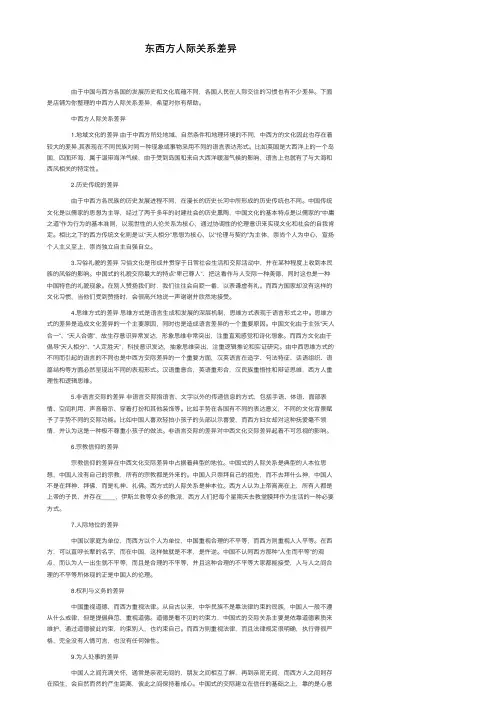
东西⽅⼈际关系差异 由于中国与西⽅各国的发展历史和⽂化底蕴不同,各国⼈民在⼈际交往的习惯也有不少差异。
下⾯是店铺为你整理的中西⽅⼈际关系差异,希望对你有帮助。
中西⽅⼈际关系差异 1.地域⽂化的差异由于中西⽅所处地域、⾃然条件和地理环境的不同,中西⽅的⽂化因此也存在着较⼤的差异,其表现在不同民族对同⼀种现象或事物采⽤不同的语⾔表达形式。
⽐如英国是⼤西洋上的⼀个岛国,四⾯环海,属于温带海洋⽓候,由于受到岛国和来⾃⼤西洋暖湿⽓候的影响,语⾔上也就有了与⼤海和西风相关的特定性。
2.历史传统的差异 由于中西⽅各民族的历史发展进程不同,在漫长的历史长河中所形成的历史传统也不同。
中国传统⽂化是以儒家的思想为主导,经过了两千多年的封建社会的历史熏陶,中国⽂化的基本特点是以儒家的“中庸之道”作为⾏为的基本准则,以现世性的⼈伦关系为核⼼,通过协调性的伦理意识来实现⽂化和社会的⾃我肯定。
相⽐之下的西⽅传统⽂化则是以“天⼈相分”思想为核⼼,以“伦理与契约”为主体,崇尚个⼈为中⼼,宣扬个⼈主义⾄上,崇尚独⽴⾃主⾃强⾃⽴。
3.习俗礼貌的差异习俗⽂化是形成并贯穿于⽇常社会⽣活和交际活动中,并在某种程度上收到本民族的风俗的影响。
中国式的礼貌交际最⼤的特点“卑⼰尊⼈”,把这看作与⼈交际⼀种美德,同时这也是⼀种中国特⾊的礼貌现象。
在别⼈赞扬我们时,我们往往会⾃贬⼀番,以表谦虚有礼。
⽽西⽅国家却没有这样的⽂化习惯,当他们受到赞扬时,会很⾼兴地说⼀声谢谢并欣然地接受。
4.思维⽅式的差异思维⽅式是语⾔⽣成和发展的深层机制,思维⽅式表现于语⾔形式之中。
思维⽅式的差异是造成⽂化差异的⼀个主要原因,同时也是造成语⾔差异的⼀个重要原因。
中国⽂化由于主张“天⼈合⼀”、“天⼈合德”,故⽣存意识异常发达,形象思维⾮常突出,注重直观感觉和诗化想象。
⽽西⽅⽂化由于倡导“天⼈相分”、“⼈定胜天”,科技意识发达,抽象思维突出,注重逻辑推论和实证研究。
语言在交际文化中的差异语言是一种民族文化的表现与承载形式,不了解这个民族的文化,也就无法真正学好该民族的语言。
交际语言在语言中的涉及面非常广,只要我们学习语言就不可避免地接触到所学语言国家的交际文化,反映在语言表达方式上有许多地方存在差异,尤其是交际文化上的差异更明显。
因此,在日常交际中应该注意西方语言与母语之间存在的差异,注意由于两种文化的不同而导致在行为规范方面、风俗习惯等方面的差异,避免在交际中出现误区。
一、日常生活方面的差异中国人与英、美人在日常交往中存在诸多的差异,如:打招呼、聊天、拜访朋友、待客、约会以及待人接物等都有所不同。
中国人路遇熟人时,往往会无所顾忌地说:“啊呀,老兄,你近来又发福了!”或者以关切的口吻说:“老兄,你又瘦了,要注意身体啊!”而西方人若听你说“You are fat”或“You areso thin”,即使比较熟悉,也会感到尴尬和难以作答。
在朋友见面时,中国人见面打招呼的用语多是“你吃了吗?”“你去哪儿了?”英美人对这样的问候非常反感,他们不知道这纯粹是中国人的greeting(打招呼),而并不关心他是否真的吃饭没有还是去哪,因而对此不理解。
西方人喜欢用与个人无关又不会引起麻烦的话语打招呼或聊天。
他们见面常说:“Hi/Hello/How are you!”或是“Good morning!”等问候语。
他们聊天时常喜欢谈论天气、政治等不涉及个人隐私的话题,如“It’s a good day.”西方人,特别是英美国家的人认为年龄、婚姻、工资等涉及个人情况的问题都属于个人隐私,他人无权过问。
否则就是侵犯了他们的隐私权。
特别是女士最忌讳别人询问她的年龄。
相反中国人常以这些作为聊天的话题:“你每月赚多少钱?”“你今年多大年龄了?”“你结婚了吗?”等等。
英美人会认为这是非常无礼的表现。
二、称谓的差异称呼准则的中国特色不在于其他文化里没有这个准则,而在于称呼语的词项上。
例如“您老、小王”等在汉语里很礼貌的称呼在英语文化里却可能是很不礼貌的。
中西文化差异举例中西方文化差异较多,主要体现在人文、思想、生活习惯等方方面面。
以下进行举例:宗教信仰信仰是一种精神的寄托和心灵的慰藉。
在世界各国,均有不同的宗教信仰。
大多西方人信仰基督教,将耶稣视为上帝;而中国人更多地信仰佛教,将释迦摩尼视为人神。
隐私方面在隐私方面,中国人的隐私观念比较薄弱,认为个人要归属于集体,在一起讲究团结友爱,互相关心,故而中国人往往很愿意了解别人的酸甜苦辣,对方也愿意坦诚相告。
而西方人则非常注重保护个人隐私,讲究个人空间,不愿意向别人过多提及自己的事情,更不愿意别人来干预。
例如:中国人第一次见面往往会询问对方的年龄、婚姻状况、儿女、职业,甚至收入,在中国人眼里这是一种礼貌,但在西方人眼里,这些问题涉及他们的隐私,因此往往拒绝回答。
餐饮习俗中华民族素有热情好客的优良传统。
在交际场合中,尤其是在酒桌上,热情的中国人常常互相敬酒敬烟。
中国人宴客,即使美味佳肴摆满一桌,主人也会习惯性的讲几句客套话,例如多多包涵之类的客套话,甚至还会用筷子往客人的碗里夹菜,用各种方法劝客人多吃菜、多喝酒。
而在西方国家,人们日常交际更讲究尊重个人意愿。
比如,吃饭的时候,他们绝不会硬往客人碗里夹菜,客人自己想吃什么就吃什么,而且,他们不会用各种方法劝客人喝酒,不会非要你客人喝醉为止。
认知文化中国人对龙怀有至高无上的崇拜之意,认为它是中华民族的象征。
西方则有一个“打龙节”,在他们眼里,龙被视为恶兽。
中国人将红色视为“喜庆”“吉祥”的象征,而黑、白两种颜色被看作“不吉利”的颜色。
因此,在重大节日或婚礼上都会穿红色的衣服、挂红灯、贴红色的“喜”字。
在丧礼上,人们会穿黑色或是白色的衣服,代表了对过世的人的哀悼。
而在西方,他们就非常喜欢黑白颜色的衣服,西方的新娘在婚礼上一般都穿白色婚纱,白色代表圣洁;在参加晚会时中国女性一般穿黄色或是紫色的衣服,代表高贵。
而西方的女性则穿黑色的衣服,代表典雅。
随着西方文化的影响,中国现在有一些观念也在发生变化。
跨文化交流中的中西方文化差异由于中西方文化存在着截然不同的传统和风俗习惯,人们的生活方式,思维习惯,价值观念,语言习惯等都有很大差别,很多日常行为在日常的交际活动中也存在着明显的差异。
在中西跨文化交际中,文化冲突的事屡见不鲜,这严重影响了社会的和谐和交往的顺利进行,并使交往双方处于十分尴尬的境地。
人们在这种跨文化环境中相互交际之前,必须对对方的文化习俗和历史背景有所了解,才能避免在跨文化交际中产生尴尬的局面。
因此,我们很有必要找出其深层次的原因,并采取一定的措施来培养跨文化交际的能力,避免文化冲突现象的发生。
在全球化的背景下,不同文化的碰撞,交流和融合是势不可挡,理解中西方文化的差异及其文化冲突是进行跨文化交际和提高跨文化交际的基础,有助于中西方文化的交流与合作,有助于世界文化的发展。
由于全球经济一体化的发展,不同文化背景的人们之间的各种交流活动越来越频繁。
21世纪随着中国经济的快速发展和文化影响力的日益加强,与西方国家之间的国际交流与合作更是日益频繁与广泛。
同时,中国学生出国交流、深造的机会也日益增多。
在这种情况下,跨国界,跨民族,跨文化的经济和社会交往与日俱增,这就为我们提供了许多与西方人接触和交往的机会,然而,这也并不是一件简单的事情,因为我们所面对的是来自陌生的文化和国家,由于历史、政治、地理位置、宗教信仰等因素的不同,导致了各国、各地区的文化的不同,这就是所谓的文化差异。
文化差异会具体体现在各个方面,我们应意识到中西文化上的差异是不可忽视和改变的,应该接受这种差异,尊重和理解这种差异。
在跨文化交流和处理实际问题过程中,避免出现文化上的冲突,从而顺利地进行跨文化交流。
西方国家的思维方式,生活习惯,行为方式与我们迥然不同,在与之交往的过程中,会不可避免的会出现文化冲突的现象,因此,了解中西方文化的差异的重要性是显而易见的。
一、中西方文化差异之语言表达语言反映文化,文化影响语言的使用和发展,在以一种语言为媒介的跨文化交际中, 交际者应遵守该语言的文化语用规则。
中西方文化差异对日常交际的影响中西方文化差异对日常交际的影响随着全球化的发展,世界各国之间的交流和互动变得更加频繁和密切。
在国际交往中,不同文化之间的差异是不可避免的。
中西方文化的差异对日常交际有着深远的影响。
第一,不同的社交礼仪。
中西方文化的社交礼仪有很大的差别。
西方人喜欢交流和互动,他们注重个人的表现和自由自在的表达,不喜欢过多的限制和规矩。
而中西文化中,中国人注重谦逊、礼貌,适当的回避个人的隐私问题。
在日常交往中,如果没有了解到这些文化差异,可能给对方造成不适,导致交流不够顺畅。
第二,沟通方式的不同。
在中西方文化中,沟通方式有很大的差别。
中国人习惯使用间接表述来表达自己的观点,喜欢做到含蓄而有礼貌,适当的迂回表述;而西方文化中,人们更加直白和直接,即使难以接受某些话题或观点,也能够直接表达自己的看法。
如果我们没有了解到这些文化差异,可能会误解语言,影响沟通和效率。
第三,文化背景的差异。
不同的文化背景会影响人们的思维方式和行为。
例如,在中西方文化中,时间观念的差别是比较明显的。
中国人重视时间的质量,通常会在做事之前认真规划并严格执行时间表。
在西方文化中,时间的灵活性比较大,在工作中,人们更多的考虑情况的实际情况和个人的安排。
在日常交往中,如果我们没有了解到这些文化差异,可能会无法理解对方的行为。
第四,信任和合作的价值观念的差异。
在中西方文化中,信任和合作的价值观念有着很大的差异。
在中国文化中,重视长期信任和彼此之间的合作,认为企业和家庭之间的信任和合作至关重要。
而在西方文化中,人们注重简单的交易和市场规则,工作和生活是分开的,信任的建立更多是由于能力和行为的表现。
如果我们没有了解到这些文化差异,可能会导致合作和工作的信任存在障碍。
总结:中西方文化的差异对日常交际有着深远的影响。
在面对不同文化的交流时,我们应该以理解和尊重为前提来加强交流和合作,从而实现双方的共赢。
中美日常交际中的文化差异中文摘要:文化规定和制约着人们的言语交际活动。
语言是文化的载体,要实现语言的交际功能,除掌握一定的词汇和必要的语音、语法知识外,还必须重视语言的文化背景知识。
本文就日常交际中的打称呼、招呼、饮食文化以及“身势语”等几方面体现的文化差别进行分析比较,旨在使人们提高对文化差异在英语学习中的影响的敏感性,以便更好地用英语深入、灵活、得体和有效地表达思想,进行交流。
关键词:称呼;招呼;饮食文化;身势语;差异一、称呼(call):1,亲属称呼语,英汉皆有亲属称呼语。
但汉语中采用亲属称呼的情况要复杂得多。
在现实生活中,我们发现英语中的亲属称呼语要远少于汉语。
例如,英语中的“uncle”,在汉语中有四种关系:父亲的兄弟(伯父或叔父),母亲的兄弟(舅父),父亲姐妹的丈夫(姑父)母亲姐妹的丈夫(姨父)。
同样“aunt”一词在汉语中也有四种关系。
这种一对多的关系可列表如下:爷辈、父辈、同辈、晚辈爷爷grandfather 伯父弟堂哥brothernephew 侄女女niece2,直名称呼中美文化都有直呼其名的招呼方式,只是美国人更习惯于称名,而不是全名(fu ll name)。
一方面,它表现出一致关系,即双方处于平等的关系之中。
另一方面,它表现出居于优势(如年长些,辈分高些,社会地位高些),另一方居于劣势。
因此直名称呼中也表现出对社会地位、年龄、辈分的牵涉。
中美各自在使用此称呼方式时对于辈分和年龄的不同情感、心理,都与各自的文化息息相关。
3,通用称呼语,通用称呼语指可以广泛应用于同一社会范畴内各成员的称呼语。
例如,汉语中的“同志”、“师傅”等,英语中的Mr./Mrs./Miss加上姓,或“sir ”(先生)/“Madam”(女士)等。
如今的汉语称呼语中也有了“先生”、“小姐”之类的词,这与中国自先秦以来的“先生”、“小姐”有截然不同的意义。
这一现象也反映出中国正处于转型时期,人们的价值观也由讲政治、讲集体向讲经济、重个性的方向发展。
中西方日常交际中的文化差异(商务英语专业082班,孙静)摘要:汉语与英语中有大量的日常对话,由于地域文化、历史文化、风俗习惯、宗教信仰及历史典故的不同,日常交际中也呈现出诸多文化差异。
随着经济全球化、信息全球化时代的到来,中国与西方国家之间的交流和合作越来越密切。
但是,由于缺乏对西方国家文化背景的了解,在中国人与西方人交际的过程中,出现了一些交际障碍和误解,本文主要就日常交际中容易引起误会的中文化差异进行分析和比较。
There are quite a lot of daily dialogues both in Chinese and English, however, because of the differences of background, history, custom, religion and history story’s culture, there exists lots of culture differences in daily conversation. With the coming of globalization of economy and information, the cooperation between China and Western countries is becoming closer. Yet, due to the lack of culture background of western countries, there exists some barriers and misunderstandings during the communication between Chinese and western people. And this article aims to analyze and compare the culture differences between China and western countries which are more likely causing misunderstandings.关键词:中西方文化;日常交际;差异中西方使用两种不同的语言汉语和英语,它们各有反映着本身独特的文化背景和凝重的历史传统,因而在日常交际中也存在着许多差异。
在此着重讨论,中西方日常交际中最常见的生活用语的差异。
(一)称呼用语的差异正常交际的首要条件是正确、得体地称呼对方。
得体的称呼可使双方缩小心理距离,使交际顺利进行。
在中西方文化中,因其语言表达方式的不同,而使其在称呼用语上存在较大差异。
首先要注意的是:中西方姓名的排列顺序不同。
“中国人的称呼以“姓”居首位,而英美人则以“名”居首位。
”因而中国人称呼西方人时常常会不知不觉地用西方人的“姓”而非用他们的“名”来称呼他们。
如在看到Jim Green这个姓名时,可能将其称呼为“Green”或“Mr. Jim”西方人听了这样的称呼就会感到不舒服,应该是“Jim”或“Mr. Green ”才是正确的。
在日常交际中,中国人比较注重礼节,一般先称呼后讲话。
根据对方的身份及其与自己的关系亲疏以及场合的不同,使用不同的亲属称谓和社会称谓。
其称呼注重敬意。
但是在西方,人们追求平等、亲近的人际关系,不管是在正式还是非正式场合,都喜欢用名字称呼别人(如:Tom, Joy, Peter等)。
这种做法在美国人中尤为普遍,甚至初次见面就可用名字称呼,不仅年龄相近的人之间这样称呼,年龄悬殊的人之间也可以这样称呼,一点儿也没有不尊重的意思,甚至子女对自己的祖父母、父母也可以用名字称呼,社会地位不同的人之间也这样称呼,如学生对老师、雇员对上司,老师和上司并不认为是对自己的不尊重或太随便,相反认为自己待人友好、容易亲近。
由此可以看出,“中国人习惯于非对等式的称呼类型,而西方人崇尚对等式的称呼方式。
”“中国人称呼家庭成员、亲属或邻居时,都可以使用亲属称谓。
”如非亲属之间,孩子对长辈称:“叔叔”、“阿姨”、“伯伯”等;对平辈称:“大哥”、“大姐”是常事。
但是,“在英语中用于表达亲属称谓的词一般不用于表达非亲属关系。
”如果对母语是英语的长辈称“Uncle Green”、“Auntie/Aunt Brown”,对方听了可能觉得不顺耳。
因为在英语文化中,只有关系十分密切的情况下,才使用此类亲属称谓,而后面不带“姓”,只带“名”,如“Uncle Tom”。
还可以用“Mr.” “Mrs.” “Miss/Ms”加上姓或者直接用“Sir(先生)”“Lady(女士)”来称呼。
再则,汉语的亲属关系比较具体。
最典型的如汉语中有伯父、叔父、舅父、姑父和姨父等区分,但是在英语中就用一个词“Uncle”来表示;汉语中有姨母、姑母、伯母、婶母、舅母等称呼,英语也都只用“Aunt”一词代表;再如,汉语中的堂、表兄弟姐妹,英语中“Cousin”一词也包含了全部的称呼。
这三个词究竟指谁,要弄清楚当时的情景才能知道。
此外,在中国,人们的等级观念根深蒂固,为了表示尊敬,往往会在姓的后面加上人的头衔、社会职位等,如“郭校长”、“杨经理”、“周局长”、“刘老师”等称呼。
但是,“Principal Guo”、“Manager Yang”、“Bureau Director Zhou”、?“Teacher Liu”等称呼不符合英美人的习惯。
在西方,只有少数职业和职务可用于称呼。
如教授可称Professor;医生或有博士学位的人称Doctor;州长和市长可称Governor 和Maj or,等等。
英语中这种职业/职务衔头+姓氏的称呼形式使用范围狭小,用途十分有限。
西方人不喜欢这样的称呼,认为这样的称呼很虚伪。
(二)打招呼用语的差异不管是在中国还是在外国,见到朋友或熟人打声招呼,是一种常见的礼貌行为。
中西方由于文化传统和风俗习惯的不同,因此他们在见面时打招呼的用语和习惯也大相径庭。
中国有浓厚的食文化,自古以来就有“民以食为天”的谚语。
因此,中国人见面时喜欢用“你吃了吗?”来和对方打招呼,但这句问候语实际上已失去了其字面上意义,不是用来询问信息,而只是打招呼的一种方式。
因此,回答“吃了” 或“还没有吃”均无关紧要。
然而,若按字面直译成英语“Have you had your dinner”来问候西方人,按照其文化习俗,意味着邀请对方去吃饭;男性若问女性则表示要与对方交朋友或约会的愿望。
可是,中国人说这句话时,通常是没有“邀请”和“约会”这层意思。
汉语中另一种常用的打招呼语是“你去哪里啊?”、“到哪儿去啦?”这两句话在汉语中是打招呼的方法,而不是真想了解问人到哪里去。
所以,对方可以任意给一个回答,也毫不觉得难堪。
然而,如果用同样的方式与西方人打招呼“Where are you going”、“Where have you been”西方人往往会理解为是一个询问信息的问句,会使他们感到难堪,甚至会感到生气,他们会觉得说话者在干涉他们的私事。
他们虽然嘴上不说,心里也许会想:“Why do you ask these questions It’s no ne of your business.”另外还有一种“中国式的问候方式是看见某人在做什么,就说什么。
”例如,当中国人遇见自己认识的人在洗车,可能会这样打招呼:“你在洗车啊?”中国人听到这样的打招呼觉得很自然、很正常。
可是对西方人说:“You are cleaning your car, aren’t you”他听起来觉得很奇怪、很别扭。
心里会想:你明明看到我在洗车,还要问这样的问题?简直是在说废话。
也许英美人比较讲究高效率的缘故,人与人之间没有中国人那样热情,在以上同样情况下,常用的打招呼语一般比较简单,如“Hi”、“Hello”、“How are you”或“Good mor ning!”、“Good afternoon!”、“Good evening!”等。
有时也以谈论天气的方式如“It’s a nice day, isn’t it”来和对方打招呼。
然而这些问候语中国人听起来觉得洋味太浓,觉得与对方太过生疏,一般较少使用。
(三)告别用语的差异通常人们在进行交际时,不会不发出任何信号就突然分手或匆匆离去。
离开前总会用一定的告别语,来表明自己要离开。
中国人分手时通常说:“再见。
”相当于英语中的“Good-bye”、“Bye-bye”。
但是在说“Good-bye”、“Bye-Bye”或“再见”之前,还要说些客套话,中西方由于社会文化习俗不尽相同,告别用语也各具特色。
“在中国的告别礼仪中,人们往往把道别的原因归于对方。
”[8](P71) 例如,中国人到别人家里做客,告别时多半会以“我得走了,你一定很累了。
”(“I’d better be goi ng now. You must be very tired.”)或“你明天还得早起,我该走了。
”(“You will have to get up very early tomorrow. I should go now.”)等方式向主人告别。
然而,“如果一个美国人去另一个美国人家里做客,他多半找出与自己有关的理由道别,而不涉及主人一方”[9](P71),如:“Well, I’d better let you have some sleep.”(“好了,我得让你休息了。
”)、“Tomorrow, I have to get up early. I must go now.”(“明天我还得早起,我该走了。
”)或者说:“I’ll have to go . Tomorrow I’ll go to wor k.”;“I must be say good-bye. My wife is waiting for me at home.”等等。
就如Ala n Maley 所说:“In typical western context the guests would usually find reasons to leave r elated to themselves rather than to their hosts.” 另外,也可以用“We h ave to say goodbye now. We enjoyed the evening very much. Thanks a lot.”(“我们得说再见了。
我们今天晚上过得很愉快。
多谢了。
”)或“I think I’d better be leaving now. It’s very nice to have a talk with you.”(“我想我得离开了。
和你聊天非常愉快。